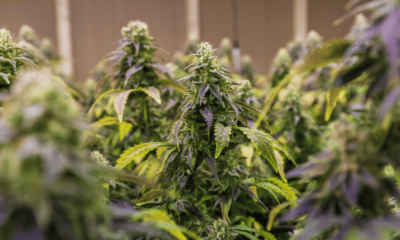A new study has identified compounds in hemp that may have the ability to help prevent Covid-19.
A study by Oregon State University has revealed that the compounds cannabigerolic acid (CBGA) and cannabidiolic acid (CBDA), may have the ability to prevent the virus that causes Covid-19 from entering human cells.
The success of the hemp compounds was discovered through a chemical screening technique invented at the university.
Researchers and scientists, led by Richard van Breedan, found that a pair of cannabinoid acids bind to the SARS-CoV-2 spike protein, blocking a step in the process the virus takes for infection.
Targeting compounds that block the virus-receptor interaction has been helpful for patients with other viral infections such as HIV-1 and hepatitis.
The researchers and scientists identified the two cannabinoid acids through a screening technique, developed previously in van Breeman’s laboratory. The team also screened different botanicals such as red clover, hops, wild yam and three types of liquorice.
In a statement, Van Breeman, author of the study said: “These cannabinoid acids are abundant in hemp and in many hemp extracts. They are not controlled substances like THC, the psychoactive ingredient in marijuana, and have a good safety profile in humans. And our research showed the hemp compounds were equally effective against variants of SARS-CoV-2, including variant B.1.1.7, which was first detected in the United Kingdom, and variant B.1.351, first detected in South Africa.”
The two variants tested were earlier Covid variants, named Alpha and Beta.
He added: “These compounds can be taken orally and have a long history of safe use in humans. They have the potential to prevent as well as treat infection by SARS-CoV-2. CBDA and CBGA are produced by the hemp plant as precursors to CBD and CBG, which are familiar to many consumers. However, they are different from the acids and are not contained in hemp products.”
“One of the primary concerns in the pandemic is the spread of variants, of which there are many, and B.1.1.7 and B.1.351 are among the most widespread and concerning.
“These variants are well known for evading antibodies against early lineage SARS-CoV-2, which is obviously concerning given that current vaccination strategies rely on the early lineage spike protein as an antigen. Our data show CBDA and CBGA are effective against the two variants we looked at, and we hope that trend will extend to other existing and future variants.”
Van Breeman stated that while variants may still occur, CBDA and CBGA may make it a more challenging environment when combined with vaccines.
The researchers noted that one of the liquorice compounds also stuck to the spike protein too, but more funding is needed to explore the possibilities.

Previous Covid research
Previous research on Covid-19 and cannabinoids has focused on the effect that CBD may have in repairing the scarring the disease causes in the lungs.
Patients with long Covid experience a cytokine storm which is an extreme inflammatory response. If the body releases too many cytokines into the system, it can lead to acute respiratory distress syndrome (ARDS).
This inflammation can lead to severe pneumonia making breathing difficult. Research has shown that CBD may reduce a number of the inflammatory cytokines associated with Covid such as IL-6 or interleukin (IL)-2.
A pre-Covid study on asthma also showed that CBD could potentially reduce cytokine production making it easier for them to breathe. The same study also revealed that it had an effect on pulmonary fibrosis which is a thickening of the blood vessels and scarring leading to long term breathing complications.
What is CBGA and CBDA?
There are a lot of different cannabinoids found in hemp. CBD is just one which has become popular in recent years although CBG is now also being added to products.
Cannabigerol is one of the cannabinoids found in cannabis. It is sometimes referred to as ‘the mother of all cannabinoids’ because it is the precursor to CBD. Other cannabinoids are derived from cannabigerolic acid (CBGA), an acidic form of CBG.
There is very little CBG in plants often as low as one per cent so it makes CBG more expensive than CBD products. CBD is much more available in plants at 20 to 25 per cent. CBG tends to be made from younger plants which contain a higher percentage. THC and CBD both begin life as CBGA before maturing and THC goes on to become CBN in older plants.
It is thought to work the same as CBD in that it interacts with our endocannabinoid system via receptors that are found all over the body. In particular, it may bind to the CB1 receptors in our nervous system or CB2 receptors in our immune system.
It is thought to potentially strengthen the function of anandamide which is a neurotransmitter that affects our pleasure and motivation. It also regulates appetite, sleep and pain relief.
CBDA is the precursor to CBD. It is present in small amounts in the plant. Once CBDA is formed, it is converted to CBD through thermal decarboxylation. It is thought to be a powerful antioxidant and could help nausea and anxiety.
[activecampaign form=33]

 News6 months ago
News6 months ago
 News6 months ago
News6 months ago
 News6 months ago
News6 months ago
 Science5 months ago
Science5 months ago
 Industry5 months ago
Industry5 months ago
 News6 months ago
News6 months ago
 Medical cannabis6 months ago
Medical cannabis6 months ago
 News5 months ago
News5 months ago













